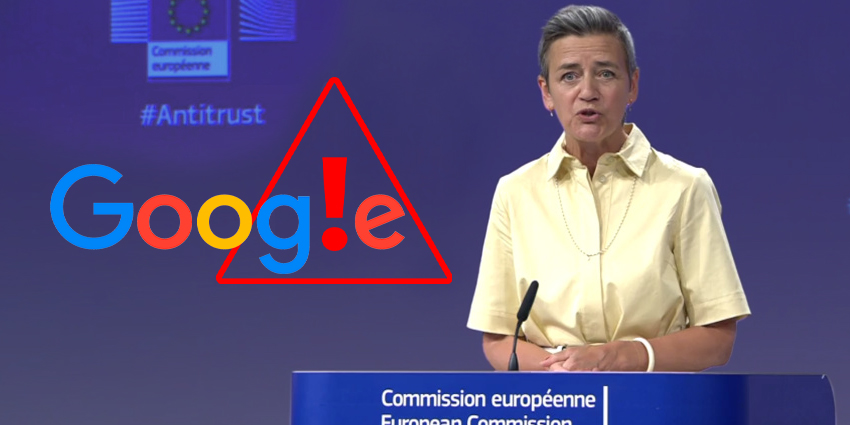The European Commission has hit Google with fresh accusations of violating its antitrust laws, citing favouritism for the latter’s own advert services over rival firms.
According to the Commission’s statement, Google abused its position over the last nine years by offering better treatment to its AdX exchange. This has resulted in ad auctions and bids favouring the tech giant.
.@Google controls both sides of the #adtech market: sell & buy. We are concerned that it may have abused its dominance to favour its own #AdX platform. If confirmed, this is illegal. @EU_Commission might require Google to divest part of its services.https://t.co/6SwdoLlN8a pic.twitter.com/2rZok2BWYs
— Margrethe Vestager (@vestager) June 14, 2023
Such actions could marginalise rival advert exchanges, violating Article 102 of the Treaty on the Functioning of the EU.
Article 102 states,
“Any abuse by one or more undertakings of a dominant position within the internal market or in a substantial part of it shall be prohibited as incompatible with the internal market in so far as it may affect trade between Member States”
It continues that abuses can involve imposing “unfair purchase or selling prices” or create a “competitive disadvantage” for market conditions.
The European Commission said it could potentially divest in Google’s technologies to discourage the Mountain View-based firm from its alleged practices.
It said in a statement,
“The Commission preliminarily finds that, in this particular case, a behavioural remedy is likely to be ineffective to prevent the risk that Google continues such self-preferencing conducts or engages in new ones. Google is active on both sides of the market with its publisher ad server and with its ad buying tools and holds a dominant position on both ends. Furthermore, it operates the largest ad exchange. This leads to a situation of inherent conflicts of interest for Google. The Commission’s preliminary view is therefore that only the mandatory divestment by Google of part of its services would address its competition concerns”
News of the antitrust violation comes after Google paid a record 4.1 billion Euros in September last year. Despite challenging the European General Court ruling, regulators forced Google parent firm Alphabet to pay 4.125 billion of the 4.34 billion initially imposed on the firm.
Why Is This Important for XR?
Google’s latest row with European regulators comes as the company rolls out its Geospatial Creator for Unity platform. The new technology will provide developers with tools to create 3D assets and immersive experience geospatially linked the physical world.
Using Unity Editor, people can create spatially-linked creative content across 3D map of the world while leveraging Google’s ARCore and Photorealistic 3D Tiles.
One of the key technologies potentially targeted by the new sanctions can include Google’s Display Video 360 (DV360) advert platform. This allows adverts and promotions using commonly used for multimedia content.
According to Adobe, its Adobe Aero Geospatial Pre-release will allow developers to “connect physical locations and AR experiences by leveraging Google’s Geospatial Creator platform.”
Adobe continued,
“Retailers and marketers can now use Photorealistic 3D Tiles powered by Google Maps Platform to view and select real-world anchor points for experiences and enhance customer engagement by delivering interactive AR content directly to supported mobile devices. This approach offers customers memorable experiences and encourages them to explore and revisit locations for ongoing interactions”
With Geospatial Creator, those creating 360 content linked to adverts could find roadblocks to anchoring content in specific regions — potentially in the European Union.
Depending on how DV360 and AdX bids on and allocates targeted ad campaigns for geospatially-linked assets and experiences, this could face severe headwinds in the future.
Ongoing US Big Tech – EU Regulator Rows
Developments in the case come amid uncertainty over the Microsoft-Activision bid — the world’s largest tech acquisition at $68.7 billion USD. The United States Federal Trade Commission (FTC) has routinely objected the deal, but European regulators backed the acquisition in a surprise show of support.
Additionally, Brussels stated it would support the deal with certain limitations and restrictions to protect cloud-based services across and from the European Union.
Meta Platforms has also opposed record fines European regulators have imposed on it, citing data law violations. The penalties come amid a row between European regulators in Ireland and the Menlo Park-based firm. The former accused the latter of violating transnational data flows, sparking strong responses from Meta executives.
At the time, Nick Clegg, President of Global Affairs, Meta, slammed the move as “flawed, unjustified and sets a dangerous precedent for the countless other companies transferring data between the EU and US.”







